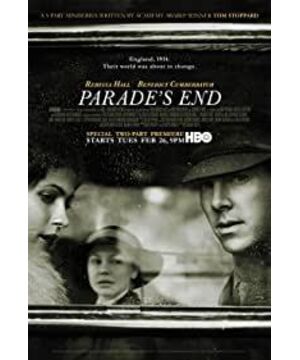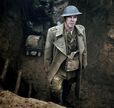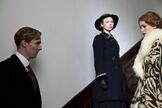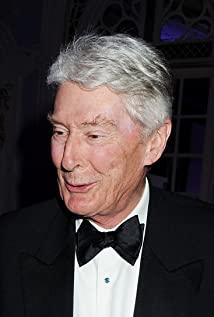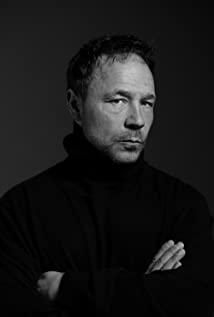What impressed me the most in the play, I think the feature that best reflects the "end of the times" is the "fireside chat" at the end of the second episode T and V, T told V that he wants to join the army, because Britain used to be the cornerstone of order. Having been mutilated by conservatism like a pig's trough, V asked T, "What is your conservatism?" Taking care of the people, even if you are poor, you should not give up the responsibility.” This passage interprets the 18th-century chivalry that the protagonist insists on at the political level, that is, the responsibility and honor of the upper aristocracy in a traditional hierarchical society. sense, morality, sense of mission. After that, T went on to say: "If Britain stayed out, then I myself would stand up and fight for France. To declare war on agriculture and industry, for the 18th century and the 20th century..." As soon as this sentence came out, the protagonist T in the play His conservatism was shown to the climax and extreme, and then he said to V angrily, "I thought you could understand", and V did understand, (distressed for the feelings of the pair) She said: "You Imagine yourself as naive as a child, even in the 18th century." Then our genius protagonist, T, is enraged by V and falls dramatically into V's unintentional trap, to which T replies: "Then Of course, I would have been right in that era", and V laughed. The T here is so cute and stupid, he is so smart, how could he act like a stupid, bad-tempered child in front of the little girl V he admires? (Perhaps he only has the most true temperament in front of her, um, midnight, fog, Shakespeare's poems, singing, unfinished kisses... This person is crazy, drag it away...) Wait for him to come back to his senses When he found out that he was wrong, he laughed a little embarrassedly. V was already laughing very happily. His statement is wrong because he ignores the relativity of the so-called "tradition and the past". For the 20th century, the 18th century was tradition and the past, but for the 18th century itself, those were the fashion and the present. So conservatives like T, in the 18th century, will become people who stick to the traditions of the 16th century, and such people in the 18th century are still standing at the end of the era. The century is still wrong and not right. That's why T said with admiration, "You really can make people calm down and think."
T asked V: "Do you still remember our trip in the fog three years ago? You said that I was a country squire who stuck to old ideas and would not interfere in the rise and fall of the country, but would only stand by and say 'I will say yes' That's it'. I'm not who I was then." And V replied to him: "Yes, I also said you should stay in the museum...", here T means that he is not what V said 'I told you so' and then the country gentleman who has nothing to do with him will definitely join the army. That is to say, T believes that he is no longer the kind of conservative person that V said, and joining the military will inevitably change himself, even if this change is passive. (He will not adjust himself to the new era, but T is actively accepting this passive change, because he is not completely denying the new era, such as secretly helping the suffragettes represented by V) Then he goes on to V Encourage yourself to break through the shackles and say helplessly: "... Now it's a choice between bad and worse, there is nothing worth living, you know, what I want can't be obtained, what I believe in has collapsed", ( A certain thinks this is T's most tragic line in the whole play, of course S's is the famous "You forgave me without mercy", V's most tragic is "Why didn't you kiss me then?"... Just drag it away! Confused mind...) Then V told him that you must have something to live for, and T asked "What's that?" In face, he pretended not to understand to deceive the innocent little V, who was successfully abducted by T) V thought of their unfinished kiss in the fog, and I really feel that the screenwriter is bloody here. He is obviously talking about the pursuit of faith and the meaning of life. To turn to love, the strength is not enough. (Love is not the whole meaning of life, screenwriter)
In fact, I prefer to regard V as a kind of spiritual pursuit and spiritual support of T, and this spiritual correlation has nothing to do with romance and love. In T's eyes, V is a beautiful, healthy, lively and lively girl who understands Latin and Shakespeare's Romeo and Juliet, has a classical education, but is also a young thinking suffragette, ( In contrast to the activist Mary, who cut the famous painting "Venus in the Mirror", the essence of tradition and modernity is combined naturally and skillfully in her body. hybrid. This combination not only complies with T's consistent principles of conservatism, but also satisfies all his expectations and fantasies about new things. For such a beautiful V, T respects and appreciates from the bottom of his heart, but when he found that he could communicate with such a beautiful V, he could not extricate himself from being deeply infatuated with her, he fell in love with her. If it is said that the two people knew each other for the first time during their "journey in the fog", and they respected and appreciated each other more than love, (that is, respect and appreciate) produced a vague feeling of vagueness, then after the "fireside chat" It is the watershed of their mutual affection for each other. This is also the reason why V asked T at the end: "Why didn't you kiss me then?", but the tragic T could only walk away silently, speechless. If you don't love, you can refuse and explain, but it is precisely because of love, and because of secular ethics and T's own principles of life, it can't be said. This silent turning is the proof of love. (Speaking of which, these two are so hard-working...see the first time T came back and met V at V's house when they were embarrassed to death)
T naively and almost perfectionistically believed that new things should be as stable and peaceful as V's, Beautiful, moral, not radical, violent and barbaric, that's why he said, "War has made civilization conquered by barbarism" when he went to get the transfer order with his brother Mark before going to the battlefield for the second time. Therefore, the last gentleman who guards tradition and civilization has also become the most tragic hero.
View more about Parade's End reviews


